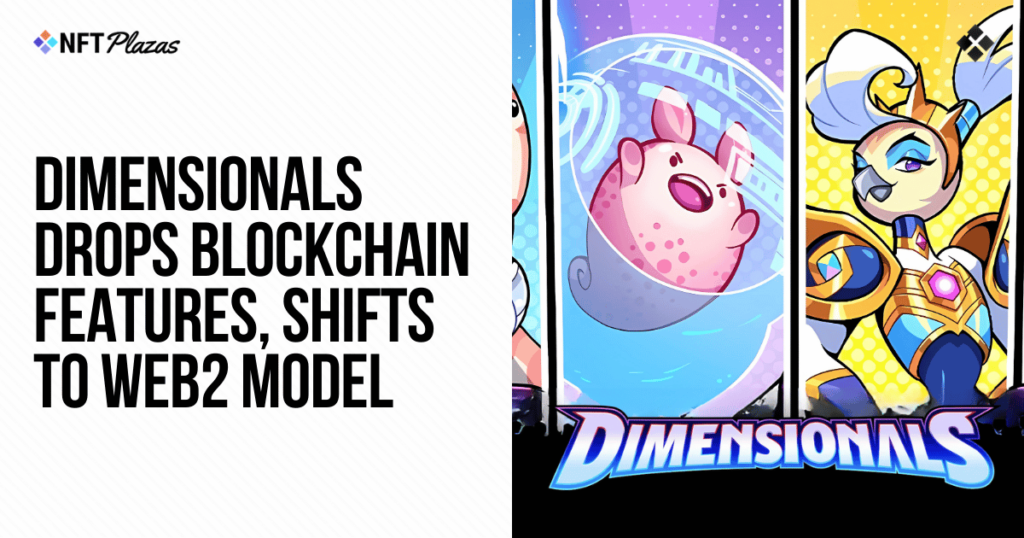Dimensionals, the roguelike deck-building game developed by Mino Games, has officially transitioned to a pure Web2 model, marking a significant departure from its initial integration of blockchain technology and NFTs.
After launching a non-blockchain version on Steam in March 2024, Mino Games explained the challenges that led to the decision, emphasizing that the project ultimately proved to be a huge financial loss.
This shift triggered a series of reactions within the gaming community, highlighting the wider impact on the web3 gaming industry.

 Source: Dimensions
Source: DimensionsWhat led to this decision?
Mino Games CEO Sash MacKinnon said Dimensionals’ journey into the web3 space began with the free launch of the Genesis Stone series in March 2023.
The goal is to increase awareness of the upcoming game and attract mainstream gamers by offering free Hero NFTs. However, the Mint was plagued by problems from the beginning. The whitelisted giveaway was inundated with bots, and the project suffered multiple DDoS attacks.
In addition, changes in the NFT market landscape – platforms such as OpenSea and Blur no longer charge royalties – caused the revenue stream that Mino Games relied on to suddenly collapse. “Our revenue from royalties immediately went to zero,” MacKinnon noted.
As the bear market approaches, the Web3 side of the business becomes increasingly challenging. The community was initially supportive, but as the value of NFTs plummeted, the community became frustrated, with some members even turning to defrauding others within the community. Despite these setbacks, Mino Games moved forward, launching a second mint and conducting a closed alpha test. However, the conversion rate from audience to active games is extremely low, and market conditions have further deteriorated.
Faced with these realities, Mino Games consulted with investors and advisors and ultimately decided that continuing to be involved in the web3 space was untenable. “We picked the wrong horse,” admitted MacKinnon, who acknowledged that timing and strategy failed. The company turned its attention entirely to making Dimensionals a web2 game, aiming to appeal to a wider audience and release on Steam.

 Source: Dimensions
Source: DimensionsHow has the community responded to this shift?
The shift to web3 has elicited mixed reactions, with many in the Web3 community expressing frustration and disappointment, especially those who have invested in gaming NFTs.
MacKinnon acknowledged that communication about the hub, initially conducted through Discord City Hall, only heightened tensions. In hindsight, he realizes a more transparent and public explanation was needed sooner rather than later.
Even after transitioning to web2, games’ past association with web3 can still cause problems. During early streaming testing in March 2024, the game received positive feedback from players, but the response from the larger streaming media was surprisingly hostile.
Due to the game’s ties to web3, many streamers refused to participate in the game, fearing audience backlash. “It’s clear…that the average gamer views web3 with more than just concern, but an outright rejection of the technology,” MacKinnon observed. This negative perception makes it clear that any association with web3 may be detrimental to a game’s mainstream success.

 Source: Dimensions
Source: DimensionsWhat does this mean for web3?
The issues facing Mino Games, such as the collapse of the NFT market and the difficulty of managing bot activity, are not unique to Dimensionals but are part of broader concerns in the industry.
The move also highlights the significant difference in audience motivations between web2 and web3 gamers, with the latter focusing more on transactions and profits than on the game itself. While the decision to drop web3 functionality in Dimensionals may be viewed as a setback, it also provides valuable lessons for other developers in the field.
Dimensionals’ experience illustrates the importance of timing, market conditions and community management to the success of web3 games. Additionally, this raises questions about how web3 gaming can evolve to bridge the gap between current niche markets and the wider gaming audience.

